« Return to all search results
Title Search Results
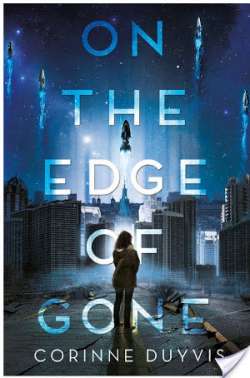
A thrilling, thought-provoking novel from one of young-adult literature’s boldest new talents. January 29, 2035. That’s the day the comet is scheduled to hit—the big one. Denise and her mother and sister, Iris, have been assigned to a temporary shelter outside their hometown of Amsterdam to wait out the blast, but Iris is nowhere to be found, and at the rate Denise’s drug-addicted mother is going, they’ll never reach the shelter in time. A last-minute meeting leads them to something better than a temporary shelter—a generation ship, scheduled to leave Earth behind to colonize new worlds after the comet hits. But everyone on the ship has been chosen because of their usefulness. Denise is autistic and fears that she’ll never be allowed to stay. Can she obtain a spot before the ship takes flight? What about her mother and sister? When the future of the human race is at stake, whose lives matter most?

The biography of Marie Antoinette's only child to survive the revolution and the woman who helped shape the future of nineteenth-century Europe.
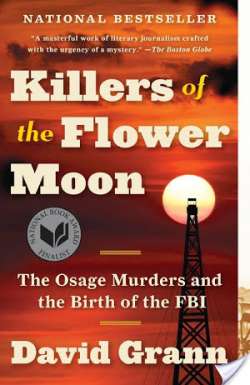
NEW YORK TIMES BESTSELLER - NATIONAL BOOK AWARD FINALIST "Disturbing and riveting...It will sear your soul." —Dave Eggers, New York Times Book Review SHELF AWARENESS'S BEST BOOK OF 2017 Named a best book of the year by Wall Street Journal, The Boston Globe, San Francisco Chronicle, GQ, Time, Newsday, Entertainment Weekly, Time Magazine, NPR's Maureen Corrigan, NPR's "On Point," Vogue, Smithsonian, Cosmopolitan, Seattle Times, Bloomberg, Lit Hub's "Ultimate Best Books," Library Journal, Paste, Kirkus, Slate.com and Book Browse From New Yorker staff writer David Grann, #1 New York Times best-selling author of The Lost City of Z, a twisting, haunting true-life murder mystery about one of the most monstrous crimes in American history In the 1920s, the richest people per capita in the world were members of the Osage Indian nation in Oklahoma. After oil was discovered beneath their land, they rode in chauffeured automobiles, built mansions, and sent their children to study in Europe. Then, one by one, the Osage began to be killed off. The family of an Osage woman, Mollie Burkhart, became a prime target. Her relatives were shot and poisoned. And it was just the beginning, as more and more members of the tribe began to die under mysterious circumstances. In this last remnant of the Wild West—where oilmen like J. P. Getty made their fortunes and where desperadoes like Al Spencer, the “Phantom Terror,” roamed—many of those who dared to investigate the killings were themselves murdered. As the death toll climbed to more than twenty-four, the FBI took up the case. It was one of the organization’s first major homicide investigations and the bureau badly bungled the case. In desperation, the young director, J. Edgar Hoover, turned to a former Texas Ranger named Tom White to unravel the mystery. White put together an undercover team, including one of the only American Indian agents in the bureau. The agents infiltrated the region, struggling to adopt the latest techniques of detection. Together with the Osage they began to expose one of the most chilling conspiracies in American history. In Killers of the Flower Moon, David Grann revisits a shocking series of crimes in which dozens of people were murdered in cold blood. Based on years of research and startling new evidence, the book is a masterpiece of narrative nonfiction, as each step in the investigation reveals a series of sinister secrets and reversals. But more than that, it is a searing indictment of the callousness and prejudice toward American Indians that allowed the murderers to operate with impunity for so long. Killers of the Flower Moon is utterly compelling, but also emotionally devastating.
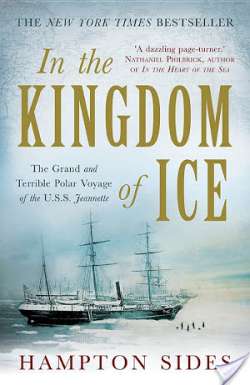
In 1879 the USS Jeanette set sail from San Francisco to cheering crowds and a frenzy of publicity. The ship and its crew, captained by the heroic George De Long, were heading for glory and the last unmapped area of the globe: the North Pole. But it was not long before the Jeanette was trapped in crushing pack ice. Amid the rush of water and the shrieks of breaking wooden boards, the crew found themselves marooned a thousand miles north of Siberia with only the barest supplies, facing a seemingly impossible trek across the endless ice. Battling everything from snow blindness and polar bears to ferocious storms and frosty labyrinths, the expedition battled madness and starvation as they desperately strove for survival. With twists and turns worthy of a thriller, In the Kingdom of Ice is a spellbinding tale of heroism and determination in the most unforgiving territory on Earth.

The Trueba family embodies strong feelings. This family saga starts at the beginning of the 20th century and continues through the assassination of Allende in 1973.

Fooled by Randomness is a standalone book in Nassim Nicholas Taleb’s landmark Incerto series, an investigation of opacity, luck, uncertainty, probability, human error, risk, and decision-making in a world we don’t understand. The other books in the series are The Black Swan, Antifragile, Skin in the Game, and The Bed of Procrustes. Fooled by Randomness is the word-of-mouth sensation that will change the way you think about business and the world. Nassim Nicholas Taleb–veteran trader, renowned risk expert, polymathic scholar, erudite raconteur, and New York Times bestselling author of The Black Swan–has written a modern classic that turns on its head what we believe about luck and skill. This book is about luck–or more precisely, about how we perceive and deal with luck in life and business. Set against the backdrop of the most conspicuous forum in which luck is mistaken for skill–the world of trading–Fooled by Randomness provides captivating insight into one of the least understood factors in all our lives. Writing in an entertaining narrative style, the author tackles major intellectual issues related to the underestimation of the influence of happenstance on our lives. The book is populated with an array of characters, some of whom have grasped, in their own way, the significance of chance: the baseball legend Yogi Berra; the philosopher of knowledge Karl Popper; the ancient world’s wisest man, Solon; the modern financier George Soros; and the Greek voyager Odysseus. We also meet the fictional Nero, who seems to understand the role of randomness in his professional life but falls victim to his own superstitious foolishness. However, the most recognizable character of all remains unnamed–the lucky fool who happens to be in the right place at the right time–he embodies the “survival of the least fit.” Such individuals attract devoted followers who believe in their guru’s insights and methods. But no one can replicate what is obtained by chance. Are we capable of distinguishing the fortunate charlatan from the genuine visionary? Must we always try to uncover nonexistent messages in random events? It may be impossible to guard ourselves against the vagaries of the goddess Fortuna, but after reading Fooled by Randomness we can be a little better prepared. Named by Fortune One of the Smartest Books of All Time A Financial Times Best Business Book of the Year
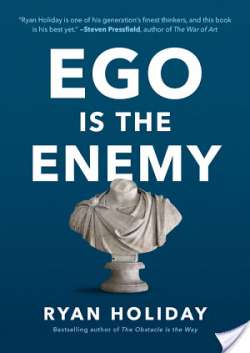
The instant Wall Street Journal, USA Today, and international bestseller “While the history books are filled with tales of obsessive visionary geniuses who remade the world in their image with sheer, almost irrational force, I’ve found that history is also made by individuals who fought their egos at every turn, who eschewed the spotlight, and who put their higher goals above their desire for recognition.” —from the prologue Many of us insist the main impediment to a full, successful life is the outside world. In fact, the most common enemy lies within: our ego. Early in our careers, it impedes learning and the cultivation of talent. With success, it can blind us to our faults and sow future problems. In failure, it magnifies each blow and makes recovery more difficult. At every stage, ego holds us back. Ego Is the Enemy draws on a vast array of stories and examples, from literature to philosophy to history. We meet fascinating figures such as George Marshall, Jackie Robinson, Katharine Graham, Bill Belichick, and Eleanor Roosevelt, who all reached the highest levels of power and success by conquering their own egos. Their strategies and tactics can be ours as well. In an era that glorifies social media, reality TV, and other forms of shameless self-promotion, the battle against ego must be fought on many fronts. Armed with the lessons in this book, as Holiday writes, “you will be less invested in the story you tell about your own specialness, and as a result, you will be liberated to accomplish the world-changing work you’ve set out to achieve.” From the Hardcover edition.
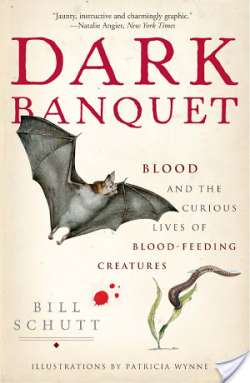
A look inside the world of animals that feed on blood, examining the ecological roles and life cycles of the vampire bat, leeches, ticks, mites, bedbugs, and a feared vampire fish known as the candiru.
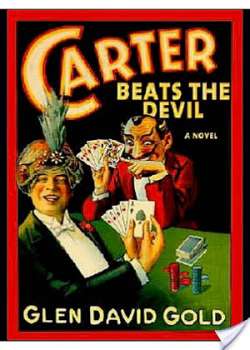
The response to Glen David Gold's debut novel, Carter Beats the Devil, was extraordinary. He hypnotized us with his portrait of a 1920s magic-obsessed America and of Charles Carter--a.k.a. Carter the Great--a young master performer whose skill as an illusionist exceeded even that of the great Houdini. Filled with historical references that evoke the excesses and exuberance of Roaring Twenties pre-Depression America, Carter Beats the Devil is a complex and illuminating story of one man's journey through a magical and sometimes dangerous world, where illusion is everything.
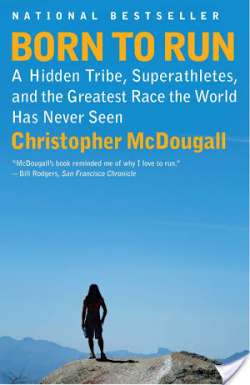
Recounts the author's experiences with the reclusive Tarahumara Indians, whose techniques allow them to run long distances with ease, and describes his training for a fifty-mile race with the tribe and a number of ultramarathoners.
